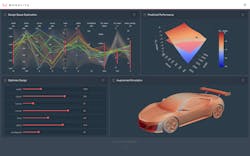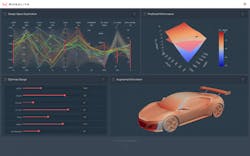From automotive giants to software juggernauts: How AI is transforming the car industry
The world’s largest automotive companies are experiencing one of the most radical technological shifts to their industry for decades.
Car companies get ahead with AI-driven design tools
AI-enabled technology, such as digital twins and machine-learning predictive capabilities, are benefiting some of the most cutting-edge automotive companies in the world today. This kind of technology enables engineers to create a virtual replica of a car, using real driving data that helps engineers to better visualize and assess the impact of their design choices on real performance. Technology like this has been estimated to reduce the number of driving tests done during the final development stages by up to 70%, saving engineers valuable time and money during the development process.
Car-analytics dashboard using AI
However, the capabilities of predictive AI technology exist squarely with the ability to leverage existing data lakes. For machine-learning algorithms to operate with enough sophistication to perform predictive tasks such as those associated with virtual track testing, there needs to be a volume and variety of data from which these algorithms can draw.
The need for large data pools is part of why the larger automotive companies are making the most headway with developing software in-house, as opposed to smaller and more agile competitors. Companies like, Kistler Honda and BMW have vast data assets that create a bank of knowledge to utilize when training models for predictive purposes.
Yet, there are two key challenges these large companies still come across when trying to leverage their own historic data for in-house software development. Namely: is our existing data compatible with the purposes of our machine-learning models, and is our model intelligent enough to perform the task being asked of it?
Unfortunately, it’s impossible to go back in time and change the kind of data you collected with a view to using this information to inform future algorithms. Any data generated and collected with machine learning in mind needs to be explored carefully as the original design-space sampling might not be optimal.
With these large companies however it’s common that they will find some data that works for building predictive models. However, the sophistication of a model, and creating models intelligent enough to utilize said data is generally a bigger issue for industry giants, one traditionally much harder to solve in-house.
Bridging skills gaps to create new tools for engineers
Inevitably this leads many large automotive companies to a predicament—how to tackle their current skills shortage to refocus their efforts into software development? VW for example, according to CIO, Martin Hofmann, has "about 10,000 engineers but only a few hundred programmers.” This highlights the need for people “who can work in cloud computing and who are proficient with artificial intelligence” with the background or comprehensive experience of an engineer.
Bridging the skills gap by training either engineers or data scientists to do the other’s job takes too long, drains resources, and may simply not be the way these experts want to work. Understanding why this knowledge gap exists comes down to the way in which ML models have been designed in the past. Machine learning can be generic. Engineers need a model created for engineering purposes, one that speaks their language and becomes an additional tool within their repertoire. As with all ML, subject-matter experts need to be at the heart of data-science development.
Specialized AI tools bring a new dawn of automotive technologies
It’s clear that those automotive companies with the winning edge currently are, and certainly will be, the ones who understand how to utilize existing data and prioritize in-house software development.
Data-science capabilities are in the process of being democratized to many engineering industries. For automotive design, in particular, this technology has already become a crucial element of design decision-making through the widespread use of predictive and digital-twin technology.
It’s now down to industry leaders to prioritize and adopt these kinds of solutions to empower their engineers and stay on top of the competition.
Dr. Richard Ahlfeld is CEO and founder of Monolith AI

